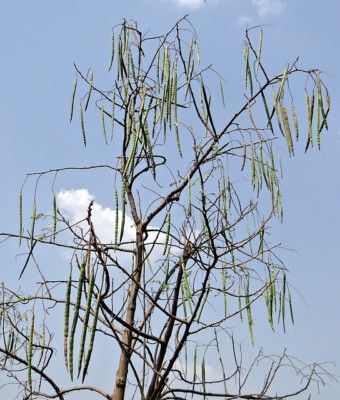Moringa oleifera – nutrients, effects and possible applications

Moringa oleifera – The tree of life
Moringa oleifera is a towering succulent tropical plant of the cruciferous genus, native to India, East Africa, Madagascar and the Arabian Peninsula. A total of 13 species of the plant are known. The nutrient-rich tree is called “tree of life” in India and has an ancient tradition as a medicinal plant in Indian medicine.
In the Ayurveda a popular wisdom reads: “Who has a Moringa tree in the garden, has always its own physician with itself”. Moringa is also known as the “tree of immortality” because it is extremely drought-resistant.
The second name horseradish tree goes back to the habit of British colonial masters in India to use the nutrient-rich tree as a substitute for horseradish.
For more information about the miracle plant, please visit: https://moringa-wissen.net/
Amazing concentration of important nutrients
It is above all the breadth of different nutrients and their highly concentrated distribution that make the medicinal plant Moringa oleifera so attractive.
Numerous vitamins, including maximum amounts of vitamins A, B2 and E, valuable minerals such as calcium, phosphorus, potassium and tin, essential amino acids, folic acid, the fatty acids omega-3 and omega-6, proteins, carbohydrates, fiber, caratinoids and oil are contained in the plant.
Thus, it contains almost the entire spectrum of nutrients that people need to live. With its wealth of different nutrients, the medicinal plant is the undisputed number one among all plants in the world.
Even considering the fact that the tree is almost completely edible, it is no wonder that the tree of life actually saves lives and makes an important contribution in third world countries against malnutrition and undernourishment.
A powerful mechanism of action
According to Indian physicians, Moringa oleifera is effective against more than 300 diseases. Especially the strong effect in inhibiting inflammation, as an antioxidant, in strengthening the immune system and promoting metabolism and blood circulation makes the medicinal plant effective against whole complexes of disease groups.
Since 2001, Moringa oleifera has increasingly been the focus of medical researchers. Its effects against various diseases have already been scientifically confirmed. For other diseases, a significant effect is already suspected.
The fact that Moringa oleifera has antibacterial, antiviral and antimicrobial effects is due to the high content of mustard oils (mustard oil clucosides), which eliminate defective cells and inhibit pathogens.
Effect against 300 diseases
Among the more than 300 diseases and disorders for which a curative effect is assumed are stomach pain and other metabolic diseases, oxidative stress, inflammation, wounds, pain, diabetes, diseases associated with high fat and cholesterol levels, hypertension, cardiovascular disorders, eye diseases, allergies, rheumatism, asthma, bronchitis, anemia, stress, jaundice, headaches, tuberculosis and cancer.
As for cancer, it is mainly colon cancer, breast cancer and liver cancer, in which the medicinal plant can seriously help. With the cancer inhibitors sulfides, glucarates, flavanoids, isothiocyanates, indoles, phenolic acid, monoterpenes, coumarins and caratinoids, Moringa has more cancer-preventing phytochemicals than in any other plant.
In addition, the bitter substances salvestrols and catechins also counteract cell degeneration. In addition, Moringa oleifera has a detoxifying effect due to its many fibers and brings the acid-base ratio in the human body back into the right balance.
Other benefits of Moringa oleifera
A great advantage of Moringa oleifera when taken is certainly that the medicinal plant is not a chemical product, which would be known to be problematic in terms of risks and side effects. It is a plant product and as shown even a very healthy one. Generally, the leaves, roots, seeds, bark, fruits, flowers and the resin are edible.
In Europe, the medicinal plant is taken as a supplement as a capsule, powder or tablet, or brewed as a tea. Moringa is also used as a hip lifestyle product in a smoothie. It is also popular for use as a salad dressing, as an extension of soy milk, and as an ingredient in cookies and pancakes.
Others use Moringa oleifera as a cosmetic product for skin creams, because the medicinal plant supports the regeneration of skin cells through the plant hormone zeatin and has a skin-rejuvenating effect.




